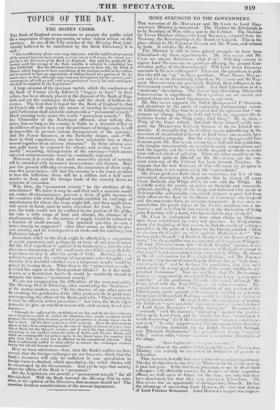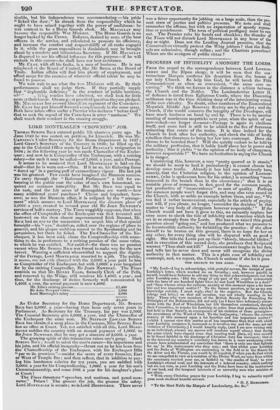MORE STRENGTH TO THE GOVERNMENT.
TIIE accession of Mr. MacAulay and Mr. CLAY to Lord MEL- BOURNE'S Ministry is announced. The Member for Edinburgh_is to be Secretary at War, with a seat in the Cabinet. The Member for 'rower Hamlets shares with Lord SEYMOUR, removed from the Treasury, the Secretaryship of the Board of Comrol.. This is the place offered to Mr. C AR 1.ES Butoma and Mr. WARD, and refused by both. It satisfies Mn'. CLAY.
The Ministry is said to have gained strength—to have been Liberalized--by these appointments. Mr. 31Ac t t: iii and Mr.
Cray are sincere Reformers : what ? Will they venture to oppose Lord Mlimenotxu on questions affecting the present Con- servative policy of the Government ? Will Lord Jon N FINALITY SOCCRIllb to his new colleagues ? Lives not the greenhorn in poli- tics who will say " ay " to these questions. Were Messrs. Mac:at:- LAY aird CLAY as theoretically Liberal as 3Ir. Clam; and Sir WrL- LIAM MOLESWORT1I are practically Radical, their influence in the Government would be inapprejable. But their Liberalism is of a " moderate" description. The idea of their disturbing Alinisterial Conservatism is superfluous. Their opinions are on record, and pointed them out to LOI'd MELBOURNE as ,safe men.
Mr. MAcAturety supports the Ballot, Quin/with/a/ Perliaments, and alterations in the mode of registering Parliamentary voters. At Edinburgh, in 3lay last, he avowed that his opinions had " un- dergone no change since, in 1831 and I e'3:2, he supported the il- lustrious leader of the Whig party, Earl Grey." Ile is, then, it Whig of the GREY school. But Earl Ga EY himself coldly sup- ports the MELBOU RN E Cabinet, because of its too Liberal ten- deneies. If strengthening the Cabinet means Liberalising it, the accession of an attached aTherent to Earl GUM can scarcely have that restorative property. But the advocacy of Quinquennial Par- liaments puts 3Ir. Maeareas among those half and half politicians who imagine statesmanship to consist in crafty compromises, and lack the sagacity and the nerve wholly to grant or wholly to resist what will not admit of splitting. There are other members of the Government quite as Liberal as Mr. MaiettLay, yet the con• stint tendency of the Cabinet has been towards Toryism. To suppose that the new Secretary of War will 'an est its progress in that direction, is not warranted by his " antecedents."
Mr. CLAY professes Radieaiism on occasions ; but it is of that convenient description which permits him in almost all cases where Radicals and Whigs differ, to cote with the Whigs. He is chiefly noted for sundry spoeciles on financial and mercantile subjects, smelling vilely of the lamp, and delivered with an air of Narcissus-like self-complacence, which detracts a good deal from their effect on the floor of the House of Commons—the and the rose-water form an orfensive compound. It Wai Once re- ported that the grand object of Mn'. CLAY'S ambition was a ba- ronetcy ; and now that he has arrived at the distinction of being joint Secretary with a Lord, who knows but he may attain it ?
Mr. CLAY 15 understood to have other claims on Ministers than those established by votes and speeches. In Whig circles, about the beginning of last session, he had the credit of v...iting pamphlet in the guise of a Letter to Mr. Gmrrn, entitled '• Shaa We or, /blot the Coach? or ?chat ought the _Radicals to do ? '"fhe anther styles himself " A Radical Member of the house of Com- mons," lint the pamphlet was a compound. of ebsevious Whiggcry. All that Ministers enact, this" Radical Member admires or ex- cuses, while he condemns whatever savoms of Radicalism except in that in.-slitied and emasculated form tolereted by Whigs. He sneers at Mn'. Ilt-ste.'s motion for IL-le:timid and Mn'. TnomAs
De NCOM13 E'S in favour of amending the Act, as "rash, hasty,
and empirieal ;" alai he deelsr,s his conviction, that they weye condemned " by a very groat »1.Ijority of the sound, intelligent, and practical Iletbrmers." Now we recollect, that .N1 r. lluxcomnsfs moti,m se-e supported by 86 Libvral Meinlu.-1-s, being " a very great majerity of the professing Li.s.‘rals who \ cted, although Mr. CLAY Si kl C't1. with the Tory-Whig7,, as on other occasions. The pamphleteer assorts, that " the left.:etion of any portion of the Liberal party on the ground of G .N.,..rmitent refusing to entertain the project of Household Suaage, would be without a shadow of rational justhication." He even doubts the expedit ecy or making the Ballot an "open question,- and ente:.s into a I.Weured defence
of Lord J011 N RUSSELCS " final ity ilk id I I k` cennot deal " seriously" with Mr. GROTE'S " reasoning against the position taken up by Lord Jonx, and he should not ii .v " considered it
worth de mol ishlug" (!) it' Mr. t; ROTE had not " to re- sort to it." To otrer support to tlie .',I7estry On condition that they
should " declare forthwith the llitlint, Household Suffrage, and Triennial Parliaments," p c' hi'' tes. deems" suicidal
folly ;" and Ile adds, " never 0 re eten' illustration of the adage, (41105 Jupiter ie le:es The annexation of the author of i p.,:nphlet It t;R: 1`.1.1.:LItoURNIS Ministry can scarcely be aecouuted an indication of growth in Liberalism.
That, however, is really become a matter of secondary importance. The day of objection to any of these Ministers for his polities ?nerdy, is past and gone. If the two fresh placemen, or any or all of' their colleagues, will efficiently executo the business of their respective offices, we shall agree to forget, for the time, not only that they have abandoned, but that they ever prof...ssed, Liheralism. :tit% MACAULAY has an opportunity of distinguishing himself. He has the advantage of succeeding Lord Hui) [UK, the slave and drudge of Lord FITZROY SOMERSET. Lord 11km-it:F.'s temper was imprac• tieable, but his independence was accommodating —his pride "licked the dust :" he shrank from the responsibility which he ought to have seized together with the power of usefulness : he was content to be a Horse Guards clerk. Mr. MACAULAY may become the responsible War Minister. The Horse Guards is no longer backed by the Crown. Reforms, desired by some of the best officers in the service' and calculated to promote its efficiency, and increase the comfort mill respectability of all ranks engaged in it, while the gross expenditure is diminished, may be brought about by a resolute and industrious Secretary. If Mr. MACAULAY IS disposed to use his official influence for this purpose—if he will embark in this career—he shall have our best assistance.
Mr. CLAY, with all his faults, is a man of business. He is not misplaced at the Board of' Control, like Mr. &MIL at the Board of Trade. Indian affairs will find him plenty of employment, and afford scope for the exercise of whatever official talent he may be found to possess. • We now wait to see what the two Ministers will do. By their performances shall we judge them. If they partially supply that "deplorable deficiency" in the conduct of public business, Whig toadies have admitted, we shall look for little more at their hands. On one great practical question they are pledged. Mr. MACAULAY has avowed himself an opponent of the Corn-laws : Mr. CLAY has put himself forward conspicuously in the same array. Both have taken office under a Premier who declares "before God" that to seek the repeal of the Corn-laws is utter "madness." We stall watch their conduct in the ensuing struggle.



























 Previous page
Previous page